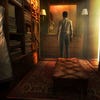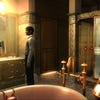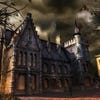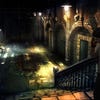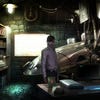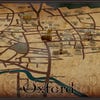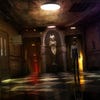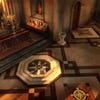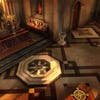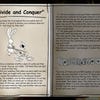Gray Matter
University challenge.
As with the presentation, so with the interface. Gray Matter's PC incarnation uses the fairly standard single-button click for interacting with the environment, but the 360 port opts for a radial menu that allows you to zip between all available hot spots in a room. You'll get the hang of it over the course of the game's first few hours, but while the designers do their best to map the position of in-game objects to the correct parts of the wheel as often as possible, they fail just as regularly. Actually trying to move the arthritic characters about by themselves is a nasty business, so, compromised as it is, it's best to work from this radial menu whenever you can.
If it's tempting to put most of these problems down to the game's difficult gestation, it's harder to explain why Gray Matter's story and characters can often seem so underdeveloped. Erudite and intriguing in concept, Jensen's latest narrative frequently plays out as a drafty kind of soap opera, its plot twists growing increasingly silly and its characters too thinly conceived to carry you past the rough patches. The supporting cast of college students, magicians, rival professors and housekeepers are a rabble of shrill stereotypes, while Styles is grumpy rather than mysterious and only Sam emerges with any kind of likeable clarity.
As Gray Matter ping-pongs between the two leads in alternating chapters – as Sam tries to unravel what's going on and Styles attempts to bring his dead wife back through recreating specific memories – the results vary. Sam's sequences are often witty and clever, covering classic adventure game territory as you bypass irritating secretaries, work your way into locked rooms, and follow a trail of playful clues left for you by the Daedalus Club.
Here, Gray Matter's innovation lies with Sam's magic skills, meaning she'll often be called upon to play reworked tricks on people to get what she wants – she'll gamble with an unfriendly handyman in a rigged game of chance, say, or pinch an ID card from a pal with a clever sleight. Sam's repertoire is limited to a book of a dozen or so illusions, and after you've selected the right one for the right occasion, you have to coach her through the intricacies of performing it, moving objects from the left hand to the right sleeve, for example, and choosing when to misdirect. As a spin on programming-style puzzles, it's smart, if limited, stuff and helps to enliven some of the game's more prosaic moments.
The Styles sections are considerably less entertaining, however, as you wander around Dread Hill House and a nearby park, searching out triggers that will allow him to rebuild his memories. It feels less like an adventure game and more like you're being asked to act your way through a low-budget movie that you haven't been given the script to
It doesn't help that Styles and his late wife's relationship is filled with naff clichés like initials carved on trees (do this, incidentally, and a rule of narrative dictates that at least one of you will die young) while flashbacks forever seem on the brink of blossoming into either very soft pornography or a Herbal Essences advert. I'm no doctor, Styles, but why not knock this thought projection bunk on the head, forget about your wife – rendered in the game's rudimentary 3D modelling, she'd be a grotesque knock-kneed horror, anyway – get rid of your stupid faux-anime haircut and just move on?
Moving on is ultimately something this game has trouble with. Its creaky, theme-park England and its stuffed-shirt students mark Gray Matter out as an unashamedly old-school adventure. But it's also a linear and arthritic experience with few opportunities to work outside of the prescribed solutions to any puzzle, and a strict timeline that drags you through the narrative chapter by chapter with little in the way of distraction or character development.
The end result is one of those strange games that I suspect will be more fun to look back on in a few months than it is to play right now. Fittingly – given Gray Matter's preoccupation with memory and its shortcomings – it will probably be quite nice to reflect on the lazy sunlit sprawl of rooms that makes up Dread Hill House when you can forget that you never had anything particularly interesting to do there, or to recall hanging around the quad at St Edmund's College when you don't have to actually talk to anybody nearby to inch the plot forward.
Gray Matter's not a bad game so much as a disappointing one, then. And the disappointment is all the sharper because it's so obvious that the designer is capable of much more.

